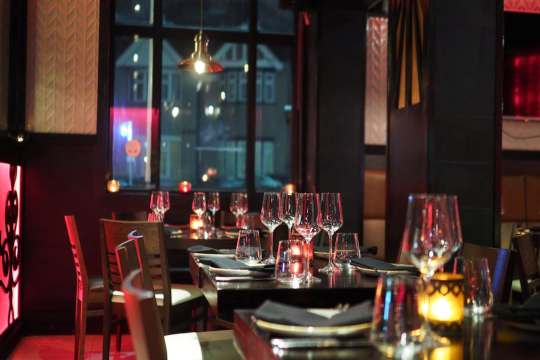Start-up sector is rife with opportunities and increasingly professionals are chucking their jobs to start a business venture. Regardless of the background, start-ups are vying to dish out a novel business idea and capture the biggest market share.
However, most of the start-ups fail even before they gain ground. Getting the plan into actionable insights is difficult in every industry and if you wish to start a restaurant, then the sector is fraught with even more challenges and cut-throat competition.
Positioning a new restaurant up against an existing passionate run, elegantly decorated restaurant offering unique concepts, best-in-class upholstery and mouthwatering cuisines is intimidating. But many newbie entrepreneurs fail to even climb the first ladder due to lack of information and right business plan.
In this friction-filled space, creating a niche is never an easy sail. But having the right concept and clear goals, aiming for the bull’s eye is not difficult.
To set up your restaurant, understanding the market through competitive intelligence, preparing a road map to starting your dream eatery and knowing the way to deal with challenges is essential.
Challenges such as dealing with expenses, generating finances, sustaining staff among others has to be dealt with cleverly. Besides, adequate measures need to be taken to fill for uncertainty in profitability margins.
4 Steps You Should Follow Before Starting a Restaurant

1# Deal with Location and Rental Lease
To open a pub, retro or bar, finding the right location and striking the right lease deal is of paramount importance. Lease rentals are the major portion of the expenses that a restaurant owner has to deal with.
To lessen your burden, negotiate deal with reasonable arguments. This means that if the identified location has been vacant for a long time, then rent for initial months have to be given up by the lessor as it would take a while to generate revenue.
At the same time, if the space is in a bursting place which will generate guaranteed income, then rents can be on a pro-rating basis. Under this scheme of payment, rent for initial years will be less and will gradually rise with increasing and expanding business.
Apart from location, deciding on the scale and size of business is also essential. The dinning can be either in a small room or a huge lounge. Adequate tables and sitting arrangement to accommodate waiting queue must be kept in mind.
2# Having A Right Financing Guide

While you might have the best idea for a restaurant venture, putting ideas into action needs a lot more than just unique plan.
The key underlying impediment is the lack of adequate finances or cash reserves. At times people overlook minute details such as loan application because of which arranging finances and getting loans remains a hurdle.
Therefore, before starting with the process of arranging finances,a clearly laid out finance guide has to be followed. A distinct finance plan helps an entrepreneur take the right step at the right time.
For instance, before submitting the loan application, reviewing the business plan and clearly defining the restaurant concept is of utmost importance. Cliched as this may sound, but many applications get rejected due to lack of clear goals and only an outstanding concept hits the target. Therefore, the basic step of filling an application has to be done with utmost diligence.
Apart from this, understanding the type of loan that your restaurant requires is also essential. Whether the loan is required to finance inventory, or equipment’s or you need seed capital, understanding the key features of each and every loan type and obligations associated with them will help a person take informed decisions.
Some of the available options for a bank loan are commercial loans, business line of credit, and small business loans that can be chosen based on interest rates.
Read Also: How Loans Work: Pros and Cons
3# Manage Operations
Of the 10 startup restaurants, about 8 tend to wound up soon after due to issues in operating and managing restaurant.
Opening the restaurant is not the end of your goal, sustaining it and managing it effectively will determine the long-term success. Managing a restaurant does not mean managing cash and transactions but also encompass being prepared for a likely event.
The event can either be in the form of an expense or filling out for an absent staff or eloped chef. The team of staff to handle the restaurant has to be adequate to fill in in case others are not in. Also, enough cash reserves need to be maintained for replacing an expensive machinery or equipment.
4# Promotions

For continued restaurant operations, it is essential to promote the same either on social media or through word of mouth.
At the same time, there are several ways to create awareness about your business. Traditional methods of advertising like newspapers, or other print media to digital means such as digital campaigns to engage customers can be used.
Other websites to increase customer reach can be through Facebook, Instagram and Pinterest. Besides, taking feedbacks and knowing how much customers value your food or dislike the offerings is essential to understand the market standing.
The Bottom Line
Keeping in mind the challenges that the restaurant industry poses, setting up a new eatery is not an easy task. But with clear goals and unique plan, one can definitely create a market for their small business. Also, with increasing completion, profit margins in restaurant business remains elusive.
To overcome this uncertainty, expansion plan also has to be handy while setting up your venture. This will help guide the entrepreneur beforehand and take care of vulnerability in the market.
Read Also:
- 6 Mind-Blowing Food Packaging Ideas For Your Restaurant
- Out-Of-The-Box Ideas for Successfully Marketing your Startup in 2019
- 7 Easy to Implement Social Media Marketing Strategies for 2019
- 6 Reasons Why Franchising Is the Right Choice for Budding Entrepreneurs
- 101+ Best New Business Ideas 2019 for Entrepreneurs
Author Bio: Emma Salvador














